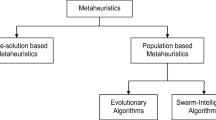Abstract
Extremal optimization (EO) is a phenomenon-mimicking algorithm inspired by the Bak-Sneppen model of self-organized criticality from the field of statistical physics. The canonical EO works on a single solution and only employs mutation operator, which is inclined to prematurely converge to local optima. In this paper, a population-based extremal optimization algorithm is developed to provide a parallel way for exploring the search space. In addition, a new mutation strategy named cloud mutation is proposed by analyzing the distribution knowledge of each component set in the solution set. The population-based extremal optimization with cloud mutation is characteristic of mining and recreating the uncertainty properties of candidate solutions in the search process. Finally, the proposed algorithm is applied to numerical optimization problems in comparison with other reported meta-heuristic algorithms. The statistical results show that the proposed algorithm can achieve a satisfactory optimization performance with regards to solution quality, successful rate, convergence speed, and computing robustness.








Similar content being viewed by others
References
Boettcher S, Frank M (2006) Optimizing at the ergodic edge. Phys A Stat Mech Appl 367:220–230
Boettcher S, Percus AG (2001a) Extremal optimization for graph partitioning. Phys Rev E 64:026114
Boettcher S, Percus AG (2001b) Optimization with extremal dynamics. Phys Rev Lett 86:5211–5214
Chen JF, Wu TJ (2014) A computational intelligence optimization algorithm: cloud drops algorithm. Integr Comput Aided Eng 21(2):177–188
Chen MR, Lu YZ, Yang G (2007) Population-based extremal optimization with adaptive lévy mutation for constrained optimization. In: Wang Y, Cheung YM, Liu H (eds) Computational Intelligence and Security, Lecture Notes in Computer Science, vol 4456, pp 144–155. Springer, Berlin
Chen MR, Li X, Zhang X, Lu YZ (2010) A novel particle swarm optimizer hybridized with extremal optimization. Appl Soft Comput 10(2):367–373
Chen J, Xie Y, Chen H (2014a) A population-based extremal optimization algorithm with knowledge-based mutation. In: Tan Y, Shi Y, Coello CAC (eds) Advances in Swarm Intelligence, Lecture Notes in Computer Science, vol. 8794, pp. 95–102. Springer International Publishing
Chen J, Xie Y, Ni J (2014b) Brain storm optimization model based on uncertainty information. In: 2014 Tenth International Conference on Computational Intelligence and Security. pp. 99–103 (November 2014)
Cheng S (2013) Population diversity in particle swarm optimization: definition, observation, control, and application. Ph.D. thesis, Department of Electrical Engineering and Electronics, University of Liverpool
Cheng S, Shi Y, Qin Q (2012) Population diversity of particle swarm optimizer solving single and multi-objective problems. Int J Swarm Intell Res (IJSIR) 3(4):23–60
de Sousa FL, Vlassov V, Ramos FM (2004) Generalized extremal optimization: an application in heat pipe design. Appl Math Modell 28(10):911–931
Ding J, Lu YZ, Chu J (2013) Studies on controllability of directed networks with extremal optimization. Phys A Stat Mech Appl 392(24):6603–6615
Eberhart R, Shi Y (2007) Computational intelligence: concepts to implementations, 1st edn. Morgan Kaufmann Publisher, Burlington
Lee CY, Yao X. (2001) Evolutionary algorithms with adaptive lévy mutations. In: Proceedings of the 2001 congress on evolutionary computation (CEC 2001). vol 1, pp 568–575
Li DY, Liu CY, Du Y, Han X (2004) Artificial intelligence with uncertainty. J Softw 15(11):1583–1594
Li X, Luo J, Chen MR, Wang N (2012) An improved shuffled frog-leaping algorithm with extremal optimisation for continuous optimisation. Inform Sci 192:143–151 (2012), Swarm Intelligence and Its Applications
Menai MEB, Batouche M (2003) Efficient initial solution to extremal optimization algorithm for weighted maxsat problem. In: Chung PW, Hinde C, Ali M (eds) Developments in applied artificial intelligence, Lecture Notes in Artificial Intelligence. Springer, Berlin, vol 2718, pp 592–603
Qin Q, Cheng S, Zhang Q, Wei Y, Shi Y (2015) Multiple strategies based orthogonal design particle swarm optimizer for numerical optimization. Comput Oper Res 60:91–110
Sun J, Garibaldi JM, Krasnogor N, Zhang Q (2012) An intelligent multi-restart memetic algorithm for box constrained global optimisation. Evolut Comput 21:107–147
Yao X, Liu Y, Lin G (1999) Evolutionary programming made faster. IEEE Trans Evolut Comput 3(2):82–102
Zeng GQ, Lu YZ, Wei-Jie M, Chu J (2010) Study on probability distributions for evolution in modified extremal optimization. Phys A Stat Mech Appl 389(9):1922–1930
Zhang Y, Gong DW, Ding Z (2012) A bare-bones multi-objective particle swarm optimization algorithm for environmental/economic dispatch. Inform Sci 192:213–227
Author information
Authors and Affiliations
Corresponding author
Additional information
The research work reported in this paper was partially supported by the National Natural Science Foundation of China under Grant Number 61403121 and 61273367, the PAPD and CICAEET project, the Fundamental Research Funds for the Central Universities under Grant Number 2015B20214 and 2013B09014.
Rights and permissions
About this article
Cite this article
Chen, J., Xie, Y., Chen, H. et al. An improved extremal optimization based on the distribution knowledge of candidate solutions. Nat Comput 16, 135–149 (2017). https://doi.org/10.1007/s11047-016-9551-8
Published:
Issue Date:
DOI: https://doi.org/10.1007/s11047-016-9551-8




